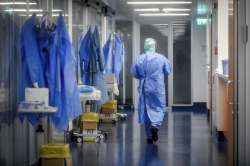Crushing the coronavirus uncertainty will be the big 'unlock' for economies: Report
Crushing the coronavirus uncertainty will be the big 'unlock' for economies around the world and to safeguard lives and livelihoods, restoring confidence is a must, according to a report by McKinsey & Co.

Crushing the coronavirus uncertainty will be the big 'unlock' for economies around the world and to safeguard lives and livelihoods, restoring confidence is a must, according to a report by McKinsey & Co.
"The objective now must be to crush uncertainty as soon as possible. As we have seen in previous crises,when uncertainty subsides, confidence returns and economic recovery unlocks — and the COVID-19 crisis has created the highest level of uncertainty in 35 years," McKinsey said.
The report said that it is unfortunately confirmed that lockdowns cause deep economic shocks, peak to trough, developed economies are likely to see GDPs decline by between 8 and 13 per cent in the second quarter of 2020.
By the end of April, more than 20.5 million jobs have been lost in the United States since the start of the pandemic. Clearly, some of the initial uncertainty associated with the coronavirus has been reduced —- but it remains high.
"When we asked global executives how long they believe their economies will take to return to pre-crisis levels, their scenario choices indicated estimates ranging between three quarters and more than five years. Similarly, when we polled consumers about when they expect their lives to return to some level of normality, answers ranged from months to years", the report said.
In many countries today, the uncertainty still starts with the virus. The path societies choose to control its spread as they strive to bring their economies back on line matters, and the stakes are high.
"We estimate that from now to the end of 2023, the difference—in lost global GDP—between economic scenarios with only partial virus-spread control and those in 'near-zero virus' situations will be as much as $15 trillion," it added.
"We now know that stay-at-home lockdowns work to control the spread of the virus. We also know that lockdowns kill the economy. The consequences are not just financial: there is also a direct human toll," McKInsey said.
"We slowed the virus. Now we need to crush uncertainty and rebuild confidence to avert structural damage to the economy—and do it fast. Lives and livelihoods will depend on it," it said.